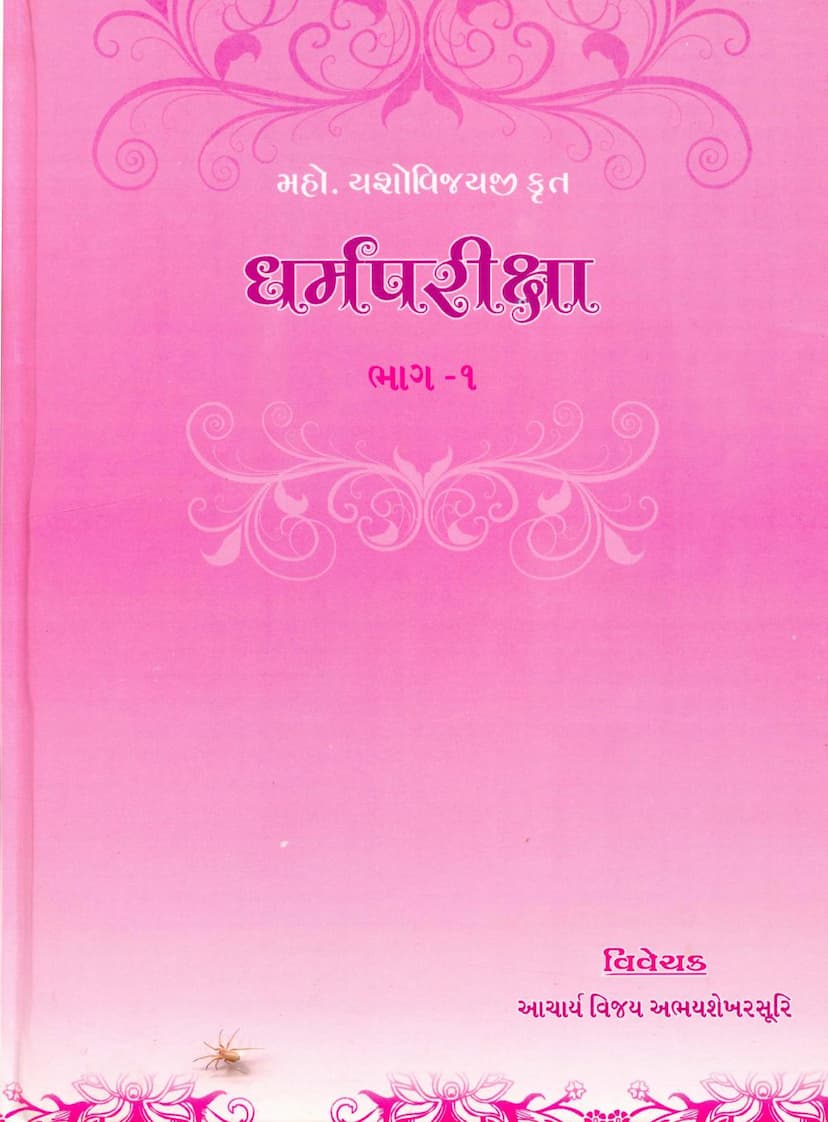Dharm Pariksha Part 01
Added to library: September 1, 2025

Summary
This is a comprehensive summary of "Dharm Pariksha Part 01" based on the provided Gujarati text.
Book Title: Dharm Pariksha Part 01 Author(s): Yashovijay Maharaj, Abhayshekharsuri Publisher: Divyadarshan Trust
Overall Purpose: The book, "Dharm Pariksha Part 01," authored by Yashovijay Maharaj and commented upon by Acharya Vijay Abhay Shekharsuri, aims to critically examine and test the principles and practices of Dharma. It delves into complex philosophical and doctrinal debates within Jainism, presenting arguments and counter-arguments to clarify and establish the true essence of Jain Dharma. The text emphasizes the importance of meticulous reasoning, scriptural adherence, and the pursuit of truth based on a balanced and impartial approach (madhyasthya).
Key Themes and Content:
-
The Nature of Dharma and its Examination: The text begins by defining Dharma as that which sustains living beings, especially in the cycle of existence (bhav-sagar). It highlights that the core principle for examining Dharma is madhyasthya (equanimity or impartiality). This is elaborated by distinguishing between two types of madhyasthya: one that is detrimental to examination (blindly stating all things are equal) and one that is essential for it (lack of fear that one's own beliefs might be refuted).
-
The Role of Madhyasthya in Interpretation: The author emphasizes that a true examiner must be impartial and free from personal biases (राग-द्वेष), whether based on lineage, community, or personal affiliations. The text criticizes blind adherence to one's own doctrines (ग्रन्थकार की अपनी मौलिक कल्पना). It stresses that adherence to the teachings of the lineage (गुरु-परंपरा) and logic derived from scriptures (आगम-युक्ति) are crucial for authentic interpretation.
-
Critique of "Utsutra" and "Viprit Sutra" Teachings: A significant portion of the book focuses on refuting "Utsutra" (contrary to scripture) and "Viprit Sutra" (perverted scripture) teachings. This involves a detailed analysis of various philosophical viewpoints, often presented as dialogues between a Purva Paksha (opponent) and an Uttara Paksha (respondent, often representing the Jain viewpoint). The author skillfully dissects these arguments, exposing flaws in logic and scriptural misinterpretations.
-
Analysis of "Mithyatva" (False Beliefs/Delusions): The text categorizes and explains different types of mithyatva, including:
- Abhigrahik Mithyatva: Stubborn adherence to one's own beliefs even when they are contrary to truth.
- Anabhigrahik Mithyatva: Equal faith in all doctrines, including false ones, without proper discernment.
- Abhiniveshik Mithyatva: Deep-seated wrong beliefs arising from attachment and conviction.
- Sanshayik Mithyatva: Doubt about established truths or scriptures.
- Anabhogik Mithyatva: Ignorance or lack of proper understanding of essential principles. The text discusses the severity and implications of each type, particularly in relation to individuals who are bhavya (destined for liberation) and abharya (not destined for liberation).
-
Discussion on "Apurnabandhakta" and "Marga-anusarita": The text explores the concepts of apurnabandhakta (non-binding nature of actions due to pure intent) and marga-anusarita (following the path). It argues that even actions performed by those outside the Jain tradition, if aligned with the core principles of Dharma (like detachment, equanimity, and ethical conduct), can be considered apurnabandhak and conducive to spiritual progress. This section touches upon the idea of spiritual progression and the possibility of virtue being found outside orthodox boundaries, albeit with critical analysis.
-
The Concept of "Ananta Sansar" (Infinite Cycle of Existence): The text engages in a deep discussion about the conditions leading to an infinite cycle of birth and death, often attributing it to mithyatva, wrong views, and specific types of utsutra behavior. It critically examines the notion of whether all utsutra leads to infinite transmigration, distinguishing between deliberate heresy and unintentional error, and how intensity of adhyavasaya (mental state) plays a role.
-
The Role of Faith and Knowledge: The book consistently emphasizes that while knowledge (jnana) is important, it must be accompanied by right faith (samyakdarshan) and conduct (charitra). Actions performed with wrong faith or mere ritualism, even if appearing virtuous, are ultimately considered unhelpful or even detrimental.
-
Reconciliation of Apparent Contradictions: The text often addresses apparent contradictions or different viewpoints found in scriptures or by different schools of thought. It emphasizes the importance of contextual understanding, the proper application of naya (viewpoints), and the ultimate goal of liberation (moksha) when interpreting scriptures.
-
The Author's Scholarly Rigor and Devotion: The introductory and concluding remarks highlight the author's profound scholarship, analytical prowess, and his deep reverence for Jain scriptures and traditions. The text also acknowledges the contributions of previous scholars and spiritual guides. The author's humble submission to the authority of the scriptures and the guidance of higher authorities is evident.
Key Contributions and Style:
- Logical and Analytical Approach: The book employs a rigorous logical and analytical approach to dissect complex philosophical and doctrinal issues.
- Scriptural Authority: It constantly refers to and draws upon a wide range of Jain scriptures and commentaries to support its arguments.
- Refutation of Misconceptions: A major contribution is the clarification of various misconceptions and the refutation of incorrect interpretations of Jain principles.
- Balanced Perspective: The emphasis on madhyasthya and the careful consideration of different viewpoints are hallmarks of the text.
- Complex Doctrinal Exposition: The book serves as a valuable resource for understanding intricate Jain philosophical concepts, making it suitable for serious students and scholars of Jainism.
In essence, "Dharm Pariksha Part 01" is a scholarly treatise that meticulously examines Jain Dharma through logical debate and scriptural evidence, aiming to provide clarity and understanding on foundational principles, while refuting potentially misleading interpretations.